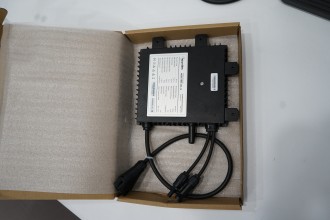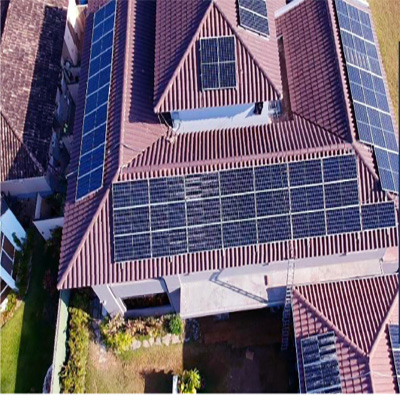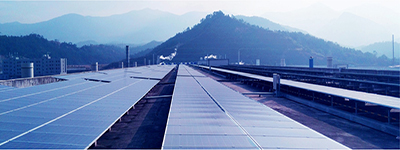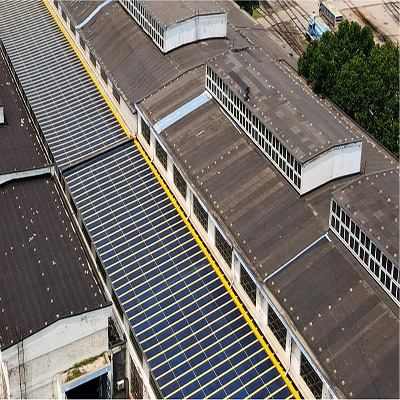Hoymiles 400W Micro Inverter for On Grid Solar System
- CertificateTUV,UL,IEC,CE,SGS
- Warranty10years/25years(optional)
HM 400W micro inverter
Product Details

-
Low cost $watt micro inverter
-
Single microinverter connects one PV modules with individual MPPT
-
High continuos output power up to 400Wac, recommended for dua max 450W solar panel
-
Globaly certified for UL1741,SAA,TUV, VDE-AR-N 4105, VDE0126,G83/2,CEL 021,IEC61727,EN50438
- Peak output power up to 400W; Adapted to 60 & 72 cells PV panels
- Peak efficiency 96.70%; CEC weighted efficiency 95.50%
- Static MPPT efficiency 99.80%; Dynamic MPPT efficiency 99.76% in overcast weather
- High reliability; NEMA6 (IP67) enclosure; 6000V surge protection
-
Integrated monitoring and power line communicationwith RDG-256 gateway,built-in WiFi
-
Integrated grounding for easy installation
Solar System Wiring Diagram

How to Apply Microinverter in an AC-Coupled Solar Battery System?
 |
① AC-coupled solar battery system as shown , is the connection of a battery energy storage system to a solar system via AC (alternating current) electricity. ② Energy from a solar system is generated in the form of DC (direct current) electricity which is then turned into AC by the solar microinverters. ③ A battery bi-directional / multimode inverter connected to the same electrical network via AC then converts any spare energy not used by the home back into DC so it can be stored in a battery.
|
The AC-coupled solar battery system is more complicated than the traditional grid-tied PV inverter system. But this kind of system can even work when grid outage or the system is the type of off grid.
For now, more and more manufacturers have launched AC-coupled solar battery system. Some of these solutions are integrated PV inverters, which others require the installers to select the grid-tied PV inverters to integrate with their battery system.
Technical Parameter
|
|
Model
|
HM-300
|
HM-350 |
HM-400 |
|
DC Input
|
Commonly used module power (W)
|
Up to 380
(single panel)
|
Up to 440
(single panel)
|
Up to 500
(single panel)
|
|
Peak power MPPT voltage range (V)
|
29–48 |
33–48
|
34–48
|
|
|
Start-up voltage (V)
|
22 |
|||
|
Operating voltage range (V)
|
16-60 |
|||
|
Maximum input voltage (V)
|
60 |
|||
|
Maximum input current (A)
|
11.5 | 11.5 | 12.5 | |
|
Maximum input short-circuit current (A)
|
15 |
|||
|
Maximum backfeed current to array (A)
|
0 |
|||
|
Number of MPPTs
|
1 |
|||
|
Number of inputs per MPPT
|
1 |
|||
|
AC Output
|
Rated output power (VA)
|
300 | 350 | 400 |
|
Rated output current (A)
|
1.36@220 V
1.30@230 V
1.25@240 V
|
1.59@220 V
1.52@230 V
1.46@240 V
|
1.82@220 V
1.74@230 V
1.67@240 V
|
|
|
Nominal output voltage/range (V)
|
220/180–275
230/180–275
240/180–275
|
|||
|
Nominal frequency/range (Hz)
|
45–55 (under 50 Hz @ 220 V & 230 V)
55–65 (under 60 Hz @ 220 V & 230 V)
|
|||
|
Power factor
|
> 0.99 default
0.8 leading…0.8 lagging
|
|||
|
Output current harmonic distortion
|
< 3% | |||
|
Maximum units per branch
|
16@220 V
16@230 V
16@240 V
|
14@220 V
14@230 V
14@240 V
|
12@220 V
12@230 V
12@240 V
|
|
|
Efficiency, Safety and Protection
|
Peak microinverter efficiency
|
96.70% | ||
|
CEC weighted efficiency
|
96.50% |
|||
|
Nominal MPPT efficiency
|
99.80% |
|||
|
Night time power consumption (mW)
|
< 50
|
|||
|
Mechanical Data
|
Ambient temperature range (°C)
|
-40 to +65 |
||
|
Storage temperature range (°C)
|
-40 to +85 |
|||
|
Dimensions (W × H × D mm)
|
182 × 164 × 29.5 |
|||
|
Weight (kg)
|
1.98 |
|||
|
Enclosure rating
|
Outdoor NEMA 6 (IP67) |
|||
|
Cooling
|
Natural convection (no fans) |
|||
|
Pollution degree
|
PD3 |
|||
|
Features
|
Topology
|
High-Frequency Transformers |
||
|
Communication
|
2.4 GHz Proprietary RF (Nordic) |
|||
|
Monitoring
|
Hoymiles Monitoring System
(Hoymiles DTU is required)
|
|||
|
Warranty
|
12 years standard, 25 years optional |
|||
|
Compliance
|
VDE-AR-N 4105:2018, EN 50549-1:2019, VFR2019,
AS 4777.2:2015, IEC/EN 62109-1/-2, IEC/EN 61000-3-2/-3, IEC/EN-61000-6-1/-2/-3/-4
|
|||
Microinverter Advantages
1.Safer:The solar panels are connected in parallel, and the system has no DC high voltage.
2.No cask effect, more power generation:The solar panels are independent from each other, without cask effect,
and the actual system efficiency can be maximized.
3.Wide range of application:A good solution to the multi-orientation, shaded roof system; Surrounding environment dust, flying flocculant more complex scene.
4.Simple system:The combination of PV moduels and micro inverter is modular, which simplifies design and construction and reduces system cost.
5.Flexible system design:Allow the design and connection of solar panels which has different powers, brands and types in the same system.
6.Smart monitoring:PV module-level monitoring to reduce later operation、maintenance and repair costs.
7.Long service life:The service life of the micro-inverter is up to 25 years, and the comprehensive investment cost is lower than the traditional system, and the cost performance is higher.
Package
  |
Factory

Projects
 |
 |
 |
|
 |
 |





